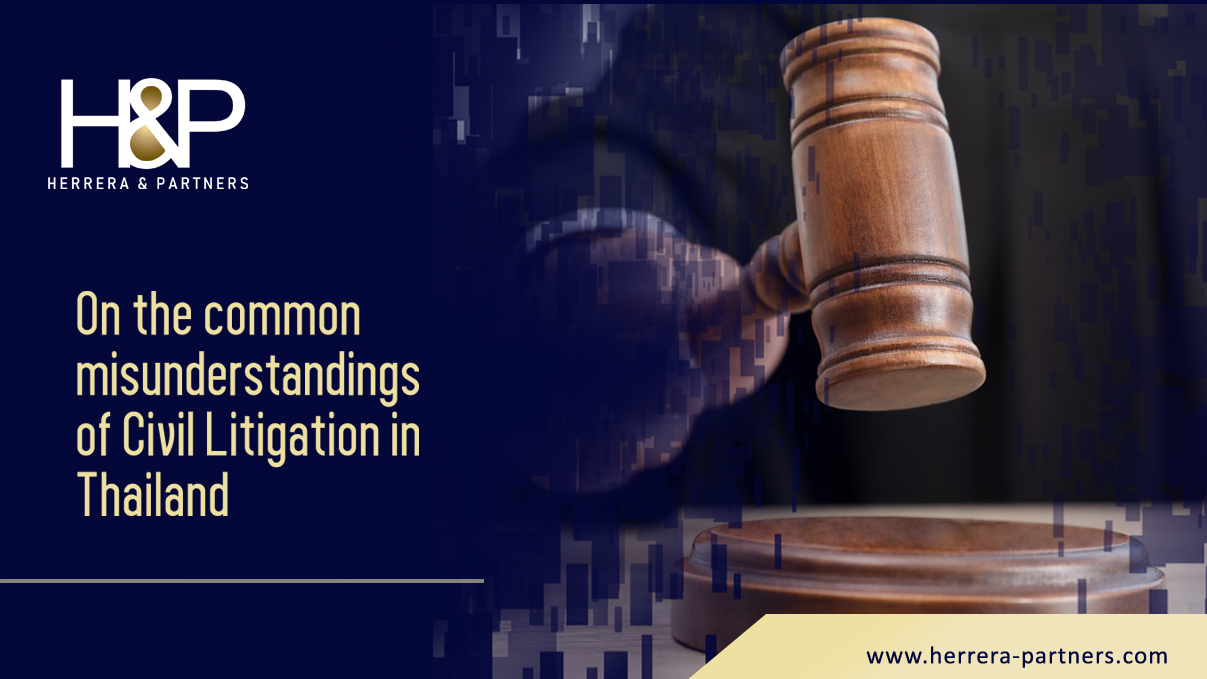
Civil Litigation is a dispute resolving method which occurs when there is a legal dispute between two or more parties, seeking monetary compensation, protection and compliance under law. H&P lawyers in Thailand have prepared this brief summary of the main aspects of Civil Litigation and the most common misunderstanding of how a civil law proceeding takes place. With a broad definition and characteristic of each type of dispute, those who are interested in instigating or participating in a civil litigation to ensure that their rights will be protected should consider the following:
Parties of the Dispute
The very first step to determine whether your dispute will be referred to the Civil Court or not, is to check the status of the opposing party. For the case to be referred to the Civil Court, all parties must be private entity, either by its very status or by consideration of the action taken by such entity. Should one of the potential litigants be a governmental organization/private organization authorized with governmental power, the case may have to be referred to an administrative court instead.
It is also very important to note that, if the dispute is between the consumer and the producer/service provider, the case shall be categorized as ‘civil consumer case’ – which would affect the procedure and the court fee.
Nature of the Dispute
Not all of the monetary disputes are referred to the civil court, our Thai court system has, by the power of court establishment enactments, categorized and referred specific type of disputes to its specialized court as follows:
- Intellectual Property and International Trade Court
- Labor Court
- Tax Court
- Juvenile and Family Court
- Bankruptcy Court
As each of the specialized court has its own jurisdictions and procedures, the procedure of a general civil case may not be applied.
The disputes that will be considered by civil court includes, but not limited to, the following:
- Tort
- Breach of Contract
- Revocation of Fraudulent Registration and Transfer
- Unjust Enrichment
- Disagreement on rights of property
Court Proceedings
Under the civil procedure code, the court proceedings can be structured as follows:
- Pre-litigation requirements – ie. serving legal notices, notifying the opposing party of a breach, pre-court mediation (if expressly stated in the agreement)
- Discussion, strategy planning and evidence collection
- Preparation and submission of complaint/defence
- Compulsory mediation hearing
- Hearing for determination of litigating issue
- Witness examination and cross-examination
- Judgment hearing
- Filing/Defending appeal of higher court
- Execution of winning judgment
Each of the above process may be postponed, delayed, or repeated by request of any litigants, as well as postponement imposed by the responsible judge. The whole process until final judgment may take a long period of time, not including the execution of judgment period depending on the execution method.
Common misunderstanding of Thai Civil Litigation Process
Due to difference in the legal system (Thailand is not a common law system) and misleading consultancy works from other legal advisors, multiple of questions are made on a regular basis to H&P lawyers relating to civil litigation. Therefore, we will explain some of the most popular misconceptions with the correct answers for your understanding.
i.The winning party is entitled to full reimbursement of the incurred legal costs spending on pursuing/defending the case.
Unlike common law courts, all the costs and expenses incurred from the litigation will not be reimbursed under the judgment, and instead will be awarded in form of ‘Attorney Fee’. The Attorney Fee awarded may range from 2,000 to 10,000 THB approximately, with rare case that the attorney fee is awarded to the winning party in the amount of 200,000 THB.
ii.Court assistance is provided on enforcing a winning judgment against the losing party
Many people think that once winning judgment is rendered, the court will assist the winning party by providing all the information relating to the losing party’s asset. In reality, once the judgment is obtained, the court has no power to investigate on the information relating to the losing party asset, effectively pushing the burden to the winning party to investigate by themselves. The court only has the power to grant a request by a winning party to summon a related entity to testify and provide the information re asset, which is susceptible to deception, as well as partial or non-disclosure.
Moreover, the ownership and property rights of the losing party may not be fully reflected by the governmental and private information. Such entity may hold an asset through different entities – ie. corporate entity, relatives, or simply turning investigable asset into movable asset to avoid execution through public record investigation.
On this regard, H&P experience is that a comprehensive due diligence or legal investigations is a must in all the litigation proceedings.
iii.Evidence can be submitted anytime during the trial
Following the increasingly popular legal/crime series with a controversial scene where the leading character submitted a secret evidence – so called ‘smoking gun’ – to the court to decisively and magically turning a losing trial to a winning one, it is actually not as easy as it seems.
In civil litigation, the evidence relating to the litigating case shall be submitted within a legal timeframe, either seven (7) days prior to the witness examination hearing, or fifteen (15) days after the witness examination hearing (as a supplemental witness list). Even though theoretically the court has the power to consider such evidence, it is very likely that the opposing party’s solicitor will oppose such submission and more conservative court will ruled the evidence out due to late evidence submission without sufficient ground.
If you need legal advice on Civil Court Proceedings in Thailand, please contact our Bangkok law firm at [email protected]


